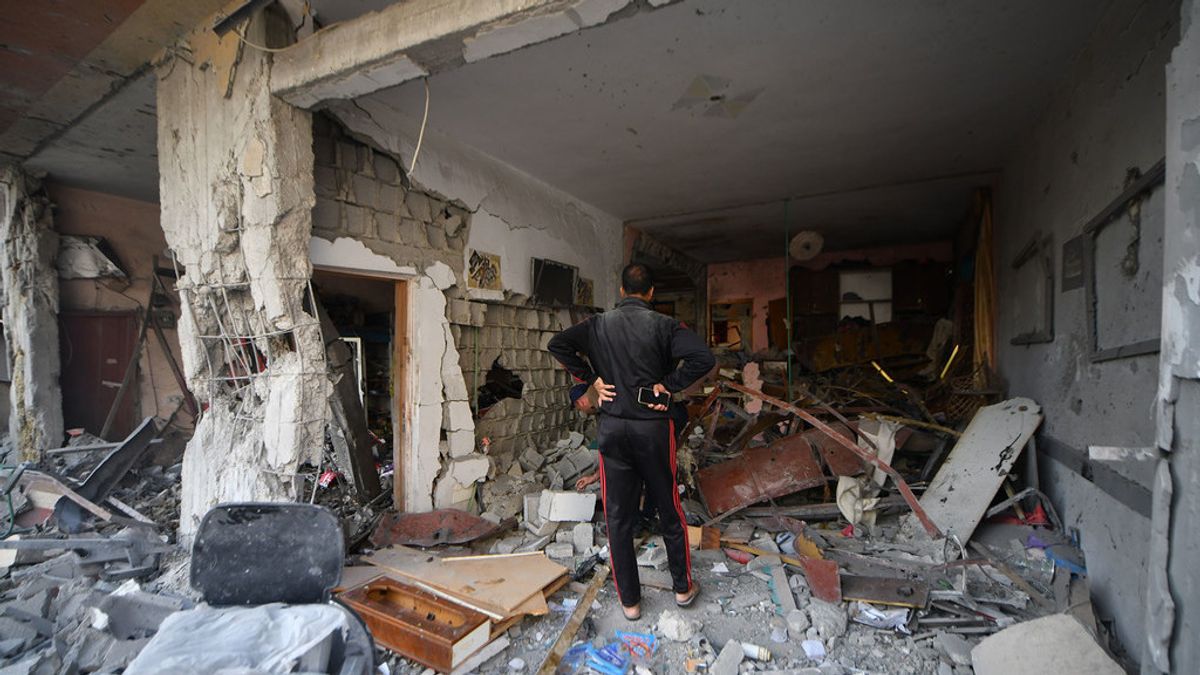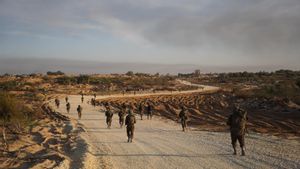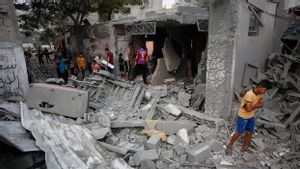JAKARTA - Amnesty International on Tuesday announced in its upload that a US-made smart bomb used by Israel in the Gaza Strip killed dozens of civilians.
The Israeli military uses Joint Direct Attack Munition (JDAM), a GPS-guided bomb with an artificial laser, in two deadly and unlawful airstrikes against homes filled with civilians in the Gaza Strip, Amnesty International said.
It is said to be a direct attack on civilians or civilian objects or random attacks, calling for the attack to be investigated as a war crime.
The organization found fragments of ammunition in the rubble of houses destroyed in central Gaza, after two airstrikes that killed a total of 43 civilians consisting of 19 children, 14 women and 10 men, with survivors saying there was no warning of an attack.
The first attack in question occurred against the family home of al-Najjar in Deir al-Balah on October 10 which killed 24 people, Amnesty said.
On October 22, airstrikes against Abu Mu'eileq's family home in the same city killed 19 people. Both houses are in the south of Wadi Gaza.
"The fact that US-made ammunition is used by the Israeli military in unlawful attacks with deadly consequences for civilians should be an urgent warning to the Biden Administration. US-made weapons facilitate mass killings of extended families," Amnesty International Secretary-General Agnès Callamard told the agency's website Dec. 5.
Two families have been devastated in this attack, further evidence of the Israeli military being responsible for unlawful killings and injuring civilians in bombings in Gaza," he explained.
"In the face of the unprecedented death toll of civilians and the unprecedented scale of destruction in Gaza, the US and other governments must immediately stop the shipment of weapons to Israel which is likely to be used to carry out or increase the risk of international law violations," he explained.
"Deliberately helping violations is against the obligation to ensure respect for international humanitarian law. A country that continues to supply weapons used to commit violations can take responsibility for these violations," he said.
Given evidence of war crimes and other offenses, he continued, the US must comply with its own laws and policies regarding the transfer and sale of weapons, including Conventional Arms Transfer Policy and Guidelines for Response to Civil Damage Incidents, all of which are intended to prevent arms transfers that risk facilitating or contributing to civil losses and human rights violations or international humanitarian law.
He added that Amnesty International did not find any indications that there was a military target at the location of the two attacks or that the people inside the building were legitimate military targets, raising fears it was a direct attack on civilians.
"In addition, even if the attack, which Israel says has informed, is intended to target military targets, the widespread use of explosive weapons in densely populated areas can make this attack indiscriminate. Therefore, these attacks must be investigated as war crimes," he said.
It is known that gun expert Oara and remote sensing analyst Amnesty International examined satellite imagery, as well as photos taken by the organization's field workers regarding the destruction of targeted locations and weapons fragments found from the rubble.
SEE ALSO:
As a result, based on the damage, the bomb that hit the family's house al-Najjar may weigh 2,000 pounds. Meanwhile, the bomb that destroyed the Abu Mu'eileq family home may weigh at least 1,000 pounds.
In both attacks, the bomb used US-made JDAM equipment. Photos of the shards of metal from the weapon clearly show distinctive round nails and safety systems that suggest they function as part of the frame surrounding the JDAM bomb body.
In addition, the code listed on the plates of the two pieces set found, 70P862352, is associated with JDAM and Boeing, the producer. The additional code listed on the plates shows that JDAM that killed members of the Al-Najjar family was produced in 2017, while JDAM that killed members of the Abu Mu eileq family was produced in 2018.
The English, Chinese, Japanese, Arabic, and French versions are automatically generated by the AI. So there may still be inaccuracies in translating, please always see Indonesian as our main language. (system supported by DigitalSiber.id)


















